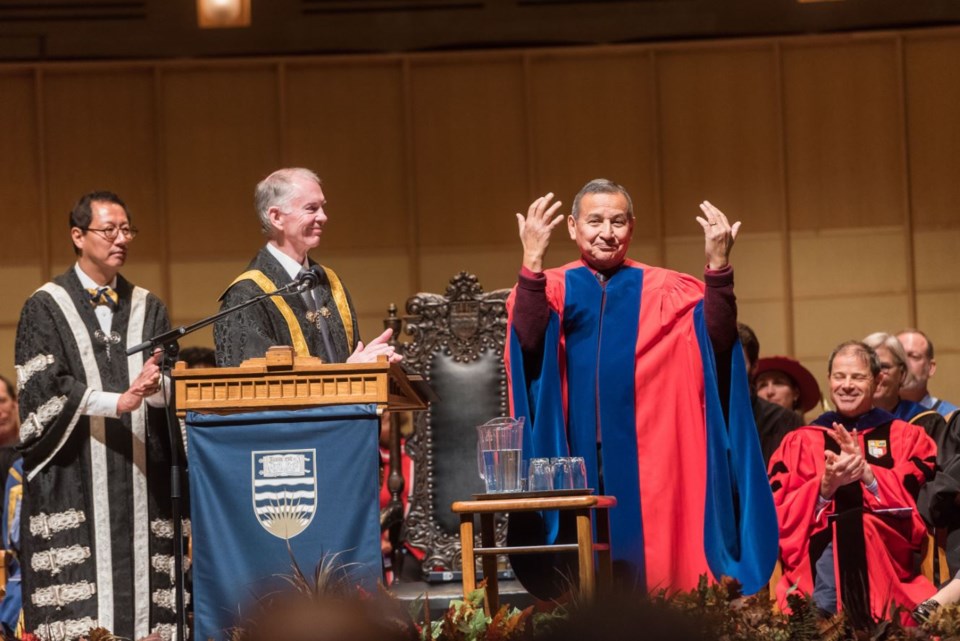If a recent teacher graduation is anything to go by, the University of British Columbia is preparing new teachers well to infuse their teaching with Indigenous culture and ways.
That’s a good thing because B.C.’s new curriculum aims to add First Nations culture and learning into all areas of a student’s learning. The Truth and Reconciliation Commission placed education near the top of its calls to action and priorities directly related to education were found throughout its report.
The ceremony began with Indigenous drumming and singing to accompany the graduates and the academic leaders as they entered the auditorium. Along with the usual academic regalia signifying various levels of achievement, there were folks dressed in traditional celebratory Indigenous clothing.
Next came the welcome and land acknowledgement that UBC is on Indigenous traditional, ancestral and unceded territory, which was spoken by Elder Larry Grant from the Musqueam First Nation. Although he stated quite explicitly that there was no agreement giving Europeans the right to use the land, he also made it clear that everyone is welcome.
Next up, was the signing of O Canada, and of course everyone stumbled over the new words, “in all of us command,” which were officially changed from “in all our sons command,” earlier this year. Although it may confuse singers for decades to come, this change is positive. Not only is it gender neutral, but it also applies acceptance of all types of people, as opposed to only white males. Well done, Canada.
UBC president Santa Ono was up next, telling the graduates, who were all either newly qualified teachers, lawyers or legal scholars, that their job is now to go out and make the world a better place.
Ono then introduced Grand Chief Stewart Phillip, a chief from Penticton who is the long-time president of the Union of British Columbia Indian Chiefs, and who was recognized with an honorary doctor of laws degree. Ono lauded Phillip for his advocacy, which he called “passionate, thoughtful and articulate.”
“You are a dedicated, tireless and widely respected advocate for the rights of Indigenous peoples,” Ono said to Phillip. “There are many examples of the ways in which you have taken an active role in the defence of Aboriginal title and rights by offering your support to Indigenous communities in need. You have also supported the Indigenous people in urban areas, who often struggle to have a voice.”
“You have advocated tirelessly for the voices of Indigenous nations and you have frequently served and taken the criticism for being the visible spokesperson for positions that have been contentious and sometimes unpopular.”��
Phillip then spoke, saying although there were few times in his life he had been rendered speechless, this was one of them.
“We must always do our utmost to follow our purpose,” Phillip said. “We are charged with the responsibility of addressing the many, many challenges in the world. We must know and understand there is no Planet B.” ��
He said climate change is the issue of this era.
“Protecting and defending the natural values in the environment — in order to meet that challenge, we will need brilliant young minds,” he said. “In order to reconcile, deep within our hearts, the differences in any attitudes we might have picked up along the way and know that the future of our grandchildren’s grandchildren depends on our ability to forge true, genuine partnerships and to blend traditional ecological knowledge and modern science together.”
Phillip was a long-term chief of the Penticton Indian Band, and in October 2006, the Okanagan Nation bestowed on him and his family the title of Grand Chief.
He is well known as an advocate for Aboriginal title and rights and has been involved in several lobbying actions and protests, both provincially and nationally.
After Phillip finished his remarks, it was time for a member of the graduating class to speak. David Robinson, an Indigenous student from NITEP, the Indigenous teacher training program at UBC, who is also an artist, announced a gift from the graduating class. The class would give a pride and trans art installation to foster inclusivity on the campus.
Robinson then shared a First Nations story, encouraging students to venture into unfamiliar territory and make a difference in the world.
Reconciliation appears to be alive and thriving at UBC, an encouraging sign for the classrooms of the future.
��
Tracy Sherlock writes about education and social issues. She can be reached at��[email protected].
��
��



